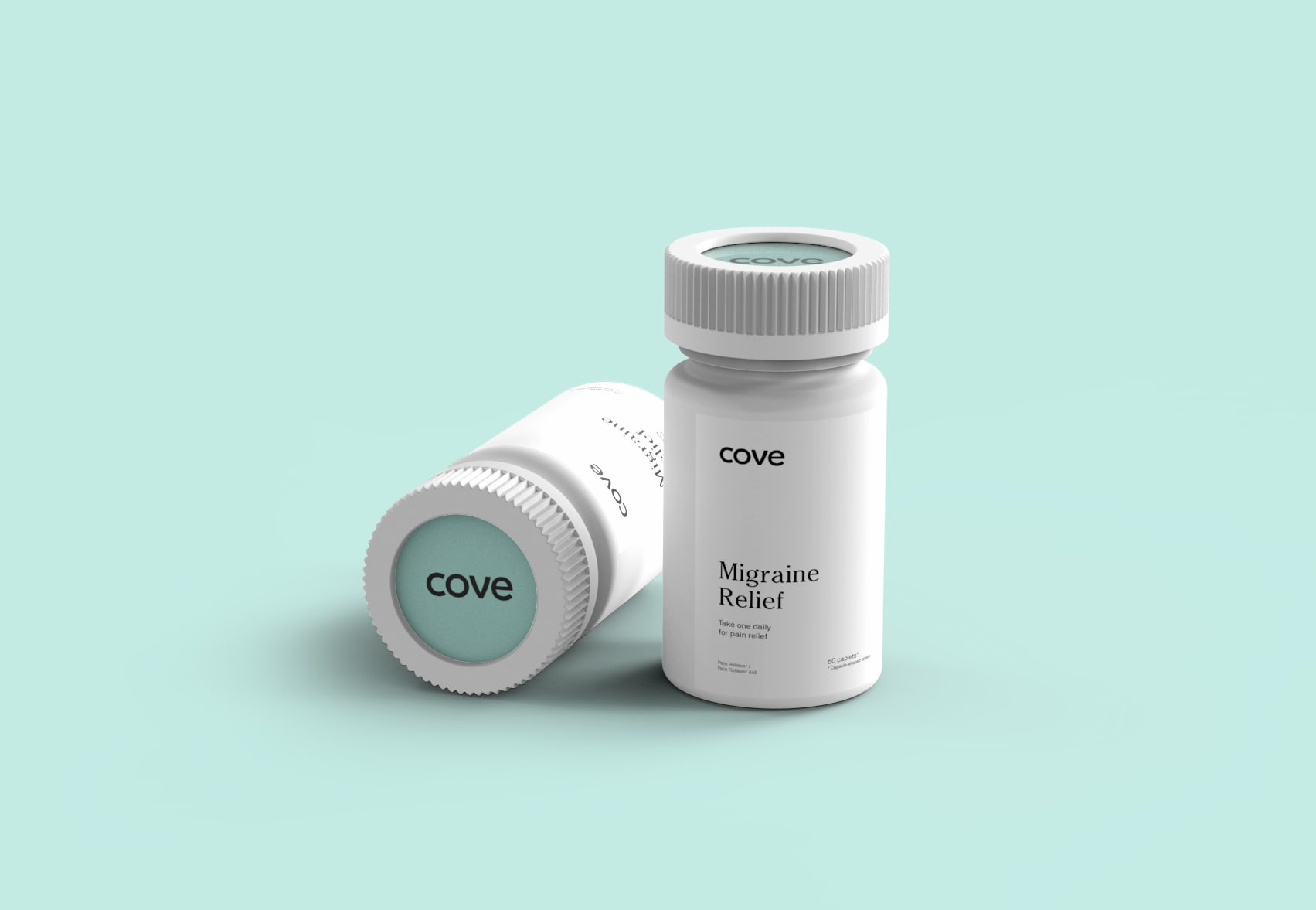What is nortriptyline?
Nortriptyline (generic Pamelor® and Aventyl®) is a preventive medication that can cut down the frequency of migraine headaches.
What will it do for me?
Nortriptyline was originally developed as an antidepressant, but studies have shown that a low dosage can help stop your next migraine before it starts.
How does it help?
Doctors believe that serotonin levels plummet during a migraine attack. By stabilizing your brain’s supply of this “happy hormone,” nortriptyline can prevent an attack from knocking you out of commission.
How do I get nortriptyline?
Nortriptyline is a prescription medicine so you’ll need to talk to your medical provider first. Get started today with a Cove consultation.
How should I take it?
You should take nortriptyline every day, ideally right before bed because it can cause drowsiness.
What should I be cautious of?
If any of the following rings true for you, mention it to your medical prodiver to avoid adverse effects or drug interactions.
- You’ve had an allergic reaction to nortriptyline or similar medications.
- You’ve had a heart attack.
- You have a history of fainting.
- You are taking other prescription medications.
Can I take nortriptyline with other migraine medications?
You can take nortriptyline with most acute and preventive medications for migraine. However, if you’re already taking amitriptyline or another tricyclic antidepressant, don’t add nortriptyline.
What if I can’t take it right away?
Nortriptyline works best if you remember to take it every night, but it’s not the end of the world if you miss a dose. If you realize you forgot within 12 hours of when you should’ve taken it, go ahead and take it. If it’s already late the next day, just take your usual dose that night without doubling up.
Where should I keep my nortriptyline?
Keep it at a cool room temperature in a dry place.
Are there any possible side effects?
Most people don’t experience severe side effects from nortriptyline, but you may notice some of the less serious effects below.
- bad dreams, confusion, or hallucinations
- constipation
- dizziness or changes in balance
- dry eyes
- dry mouth
- fast heart rate
- lightheadedness
If you experience symptoms of an allergic reaction (such as rashes, hives, facial swelling, or tightness in your throat), you should seek medical attention.
What other tricyclic antidepressants does Cove offer?
In addition to nortriptyline, Cove currently offers amitriptyline (generic Elavil®), one of the most effective antidepressants for migraine treatment.
The information provided in this article is not a substitute for professional medical advice, diagnosis, or treatment. You should not rely upon the content provided in this article for specific medical advice. If you have any questions or concerns, please talk to your medical provider.
Amitriptyline is used to treat low mood (depression). It may be given to you for other reasons. Do not stop taking this drug all of a sudden without calling your medical provider. You may have a greater risk of signs of withdrawal. Drugs like this one have raised the chance of suicidal thoughts or actions in children and young adults. The risk may be greater in people who have had these thoughts or actions in the past. All people who take this drug need to be watched closely. Call the medical provider right away if signs like low mood (depression), nervousness, restlessness, grouchiness, panic attacks, or changes in mood or actions are new or worse. Call the medical provider right away if any thoughts or actions of suicide occur. This drug is not approved for use in children. You can read more about amitriptyline’s side effects, warnings, and precautions here. Full prescribing information for amitriptyline is available here. You are encouraged to report negative side effects of prescription drugs to the FDA. Visit MedWatch: https://www.fda.gov/Safety/MedWatch/default.htm or call 1-800-FDA-1088.
Nortriptyline is an oral medication indicated that is used to treat depression. Tell your medical provider if you are pregnant or plan on getting pregnant. You will need to talk about the benefits and risks of using this drug while you are pregnant. Tell your medical provider if you are breast-feeding. Call your medical provider right away if you have allergic reactions like skin rash, itching or hives, swelling of the face, lips, or tongue, fever with increased sweating, hallucination, seizures, signs and symptoms of a dangerous change in heartbeat or heart rhythm like chest pain; dizziness; fast, irregular heartbeat; palpitations; feeling faint or lightheaded; falls; breathing problems; suicidal thoughts or other mood changes; yellowing of the eyes or skin. Call your medical provider right away if you have signs and symptoms of a stroke like changes in vision; confusion; trouble speaking or understanding; severe headaches; sudden numbness or weakness of the face, arm or leg; trouble walking; dizziness; loss of balance or coordination. Call your medical provider right away if you have signs and symptoms of serotonin syndrome like irritable; confusion; diarrhea; fast or irregular heartbeat; muscle twitching; stiff muscles; trouble walking; sweating; high fever; seizures; chills; vomiting.
You can read more about nortriptyline’s side effects, warnings, and precautions here. If you would like to learn more about nortriptyline, please see the full prescription information here. You are encouraged to report negative side effects of prescription drugs to the FDA. Visit MedWatch: https://www.fda.gov/Safety/MedWatch/default.htm or call 1-800-FDA-1088.
If you’re experiencing a mental health crisis, please call 911 or go to your nearest emergency department. If you are contemplating suicide, call 911 or call/text the National Suicide and Crisis Lifeline at 988. These services are available 24/7.


